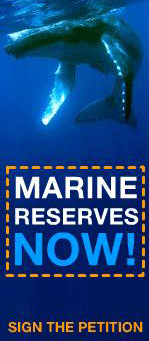News
Thousands of sharks and turtles wiped out for tinned tuna
12 August 2008

Amsterdam, Netherlands − John West, the UK's largest seller of tinned tuna, has been ranked bottom of an environmentally−friendly tinned tuna league table published by Greenpeace today, due to the use of destructive fishing methods used to catch its tuna. New research shows that John West tinned tuna is often caught using 'fish aggregation devices', or FADs, responsible for wiping out thousands of sharks and turtles every year − including some rare and threatened species.
FADs are used to attract tuna, but also attract a host of other species and juvenile tuna before everything around the FAD is scooped up in a huge net. On average, every time a FAD is used, 1kg of these other species will be caught for every 10kg of tuna.
“John West must stop selling tuna caught in this way. If the fishing industry is going to be truly sustainable, it must support the introduction of large-scale marine reserves across the world’s oceans,” said David Ritter, Greenpeace UK oceans campaigner. “Thousands of turtles and sharks are killed every year while catching tuna. And John West – the biggest tinned tuna seller in the UK – is currently the worst supplier of the lot.”
Sainsburys’ own-brand tinned tuna topped the Greenpeace league table. Its fish is caught using a pole and line, making it the only tinned tuna brand that is fished using sustainable methods. Its tuna also originates mostly from companies based in the developing tuna-rich coastal states rather than foreign fleets operating under unfair and unsustainable access agreements, making it a more equitable choice.
Although skipjack tuna, the most common species of tuna used for tinned products is more resilient to overfishing than yellowfin, bigeye and bluefin tunas, the fishing methods of skipjack are further pushing these species to oblivion world-wide due to the high by-catch of their juveniles in the FAD associated purse seine fisheries.
“In the Pacific, yellowfin and bigeye tuna are now being overfished. The huge purse seine fishery for the less-valuable skipjack using FADs is undermining the recovery of these species,” said Sari Tolvanen of Greenpeace International. “Large-scale marine reserves need to be urgently established in the high seas enclaves between Pacific Island Countries and the overall fishing effort on all tuna cut by 50% in order to put the fishery on a long-term sustainable and profitable footing.”
Greenpeace is calling for retailers world-wide to take responsibility for the seafood and tuna products they sell. The fisheries organisations tasked with the management and conservation of tuna are currently failing, due to the dominance of the interests of big industrial fishing nations and short-term profits in the these forums.
“Unless suppliers and markets take action to source only sustainable products, the industry will simply fish itself and our oceans to death”, concluded Tolvanen.
Greenpeace is campaigning for a global network of fully protected marine reserves covering 40 percent of our oceans as an essential way to protect our seas from the ravages of climate change, restore the health of fish stocks, and protect ocean life from habitat destruction and collapse.
Tinned Tuna League Table
- 1. SAINSBURYS. All of Sainsburys’ tinned tuna is now pole-and-line caught, making its own-brand the only one that is entirely fished using sustainable methods.
- 2. CO-OP. Around 50 percent of the Co-op’s tinned tuna is caught using pole-and-line.
- 3. MARKS & SPENCER. Good overall seafood procurement policy, but a great deal of its tuna comes from fishing boats that have no restriction on the use of FADs.
- 4. ASDA. Shows awareness of the problems, but a great deal of its tuna comes from fishing boats that have no restriction on the use of FADs and the tins fail to say how the fish was caught. Has expressed some support for marine reserves.
- 5. MORRISONS. Again, some awareness of the problems, a great deal of its tuna comes from fishing boats that have no restriction on the use of FADs and the tins fail to say how the fish was caught.
- 6. TESCO. The majority of Tesco tuna comes from boats that have no restrictions on using FADs, and the tins fail to tell customers how the fish was caught.
- 7. PRINCES. No restrictions on the use of FADs, no support for marine reserves and Princes’ tins never say how the fish was caught.
- 8. JOHN WEST. Never tells consumers how the tuna was caught, no restrictions on the use of FADs for the majority of its catch, no support for marine reserves and more widespread use of tuna from stocks under specific threat. Further, the John West general sustainable seafood policy lacks basic credibility.





